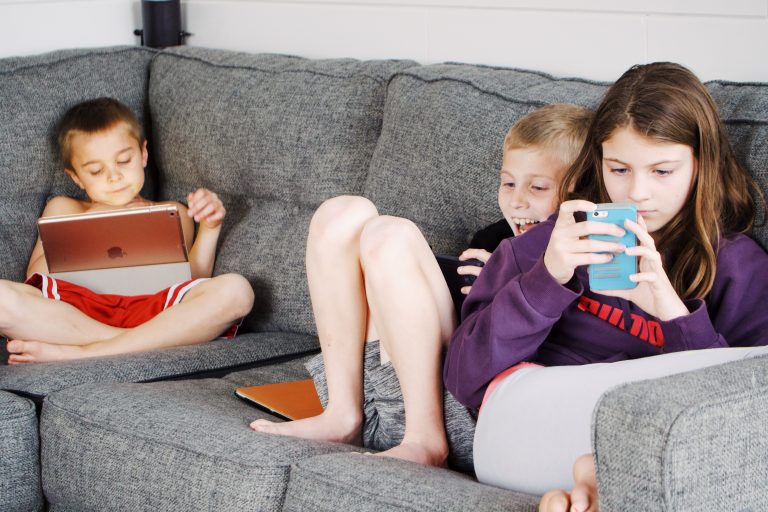
By SWNS Staff
NEWS COPY W/ VIDEO + INFOGRAPHIC
Nearly seven in 10 American parents believe it’s important for their families to take a break from technology in the new year, according to new research.
A survey of 2,000 American parents asked how parents witness tech burnout in their children and how they plan to improve their family’s digital wellbeing in the new year.
When asked what the effective tools are for managing stress in children, parents responded with tactics like taking a break from screens when they need it, exercising, breathing, dancing, meditating, playing offline games and even knitting.
Commissioned by Circle and conducted by OnePoll, the survey found 77% of respondents believe having their child take a break from technology can vastly improve their mental and emotional health.
Two-thirds of parents say they can actually tell when their child is just as stressed as they are with the year’s events – and 68% have begun to teach their child how to manage their stress because of this year’s events.
Respondents were asked about the most effective tools they’ve taught their children to help manage their stress and some of their personal methods included breaking big tasks into smaller tasks, encouraging their child to speak up if anything is bothering them and preparing their child to deal with mistakes in life.
Sixty-four percent of parents surveyed said their child is noticeably more irritable or anxious when they spend the entire day looking at a screen, so it’s no surprise that seven in 10 also agreed that more screen time can directly relate to high stress levels in their child.
As respondents reflected on their time in quarantine, 62% said they regret not enforcing screen time rules earlier, despite nearly three-quarters sharing they’ve learned to adapt their household screen time rules.
Parents agree, some of the best ways to limit screen time includes encouraging a family-wide screen off time (47%), confiscating phones and other devices (47%), distracting their kids with something else (46%) and using chores as a system to earn screen time back (42%).
Seven in 10 parents also feel like their household needs to take part in more creative or active screen time activities as quarantine continues.
“With our homes now acting as offices and classrooms, it has become increasingly difficult to carve out the screen-free time that is essential for connecting with family and pursuing other interests and activities. A screen time management solution like Circle can encourage families to refresh and recharge and are an essential tool for achieving digital wellness in the new year,” said Anne Bryan, Circle CEO and parent of four.
There are some silver linings to quarantine, however. Three-quarters of parents said they’ve been fortunate to learn more about their child during this time than ever before and 74% have sat down with their child to learn more about their day-to-day routine.
Since the pandemic began, 60% of parents have learned their child’s sense of humor, their interests and hobbies (53%), both what they learn (51%) and struggle with (51%) in school and who their friends are (48%).
“It helps for families to intentionally spend more playful, unstructured time together,” said Jamie Price, cofounder of meditation app MyLife and advocate for mindfulness for children. “Schedule time away from screens. Turn off the computer or tv, leave the phone behind, and go outside together, for example, or make time to connect by eating meals together without phones at the table.”
What challenges have parents and children had to face together since the pandemic began?
- Slow internet speeds 44%
- Having virtual meetings/classes in the same room 40%
- Getting frustrated with each other due to stress 36%
- Child having no previous access to screens before remote learning (too young) 34%
- Screen fatigue 29%
- Lack of sleep 24%
- Over-snacking 23%
- Spending less time outdoors 23%
- Burnout 22%
- Experiencing less physical activity 22%
- Seeing friends less frequently 21%
- Arguments over household responsibilities and chores 20%
- Distracting one another during calls 19%
- Arguments over screen time limits 16%
- Seeing extended family less frequently 14%
Top contributing factors for tech burnout:
- Having more work to do than usual 45%
- Not taking as many breaks 43%
- Listening to lectures online 40%
- Talking over one another on a call 39%
- Missing in-person peer interaction 32%
- Being on video/conference calls 32%
- Not moving around as much 20%
Parents’ most effective stress management tools they’ve taught their child included…
Responses have been edited for length and clarity
- Count back from 10 and journal
- Break down big tasks into smaller tasks
- Stop overscheduling themselves
- Always speak up if anything is bothering them
- Take a break and go outside for some physical activity
- Prepare them to deal with mistakes
- Let go and talk to others
- Talk to someone about their feelings and problems
- Limit their screen time and make sure they eat healthy meals
- They can’t control everything



















